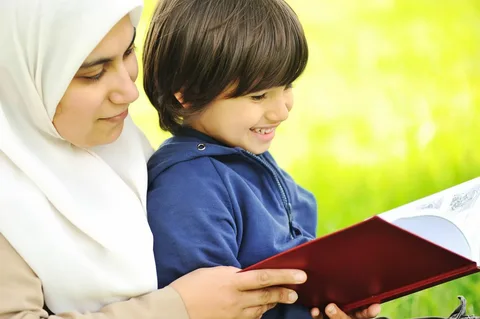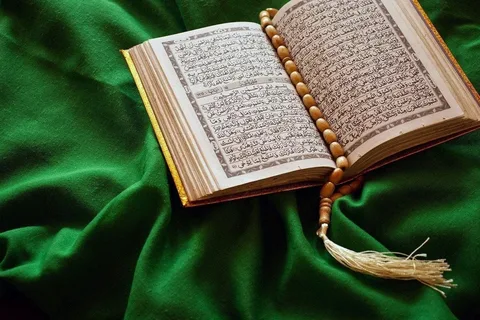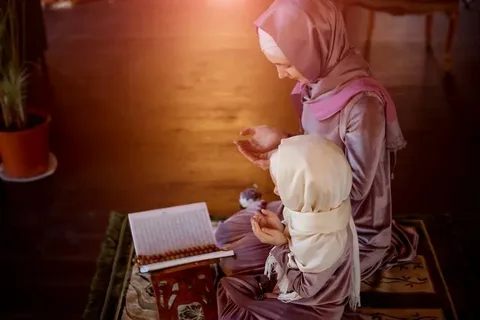The Quran, the holy book of Islam, places immense importance on the role of mothers and emphasizes their significance in a person’s life. Throughout its verses, the Quran outlines the duties, rights, and responsibilities of mothers while highlighting the deep bond between mothers and their children. It speaks to the sacrifices mothers make, the respect and kindness children owe to them, and the spiritual and moral obligations that stem from this unique relationship, in this article on Arabian Tongue we will explorer what does the quran say about mothers.
what does the quran say about mothers

The Quran places significant emphasis on the importance, respect, and care owed to mothers. It acknowledges the struggles and sacrifices mothers endure, particularly during pregnancy, childbirth, and nurturing their children. Several verses in the Quran highlight the need for children to honor, respect, and care for their mothers, linking this respect directly to one’s faith in Allah.
1. Mothers as a Symbol of Sacrifice
The Quran profoundly acknowledges the pain and sacrifices a mother endures throughout her life, particularly during pregnancy, childbirth, and nursing. The physical and emotional struggles faced by mothers are elevated as acts worthy of profound respect and gratitude. In Surah Luqman, Allah states:
“And We have enjoined upon man [care] for his parents. His mother carried him, [increasing her] in weakness upon weakness, and his weaning is in two years. Be grateful to Me and to your parents; to Me is the [final] destination” (Quran 31:14).
This verse highlights the hardships faced by mothers from conception through early childhood, emphasizing the notion of continuous sacrifice. The mention of “weakness upon weakness” refers to the many stages of fatigue, discomfort, and pain mothers go through during pregnancy and after childbirth. It calls upon children to acknowledge these sacrifices and to extend gratitude and care toward their mothers.
Read more: what does the quran say about education
2. Mothers Deserve Special Kindness and Respect
One of the central teachings in the Quran concerning mothers is the command to treat them with utmost kindness and respect. In Islamic tradition, this respect is not just limited to one’s mother but extends to both parents. However, mothers are often singled out for the immense role they play in a child’s life. In Surah Al-Isra, the Quran instructs believers:
“And your Lord has decreed that you not worship except Him, and to parents, good treatment. Whether one or both of them reach old age [while] with you, say not to them [so much as], ‘uff,’ and do not repel them but speak to them a noble word” (Quran 17:23).
The instruction here is clear: treating parents, particularly mothers, with kindness is a decree from Allah. The term “uff” is a very slight expression of annoyance in Arabic, but the verse instructs believers not even to use this minimal expression of displeasure when addressing their parents. Instead, children are expected to use gentle, respectful, and loving words when speaking to their mothers. This verse emphasizes the importance of maintaining respect for parents, particularly as they age and become more vulnerable.
3. Honoring Mothers Through Actions
The Quran emphasizes that respect for mothers should not be limited to words or sentiments but should be demonstrated through action. Honoring and caring for mothers, especially in their old age, is seen as a righteous act and an essential aspect of a Muslim’s faith. Surah Al-Ahqaf further reminds believers of their duty toward their mothers:
“We have enjoined upon man, to his parents, good treatment. His mother carried him with hardship and gave birth to him with hardship, and his gestation and weaning [period] is thirty months. [He grows] until, when he reaches maturity and reaches [the age of] forty years, he says, ‘My Lord, enable me to be grateful for Your favor which You have bestowed upon me and upon my parents and to work righteousness of which You will approve and make righteous for me my offspring. Indeed, I have repented to You, and indeed, I am of the Muslims'” (Quran 46:15).
In this verse, the link between gratitude to God and to parents is reinforced. It is a powerful reminder that respecting and honoring one’s mother is an extension of being grateful to Allah. The verse also ties the care of one’s mother to personal growth and maturity, indicating that true understanding and wisdom come with acknowledging the role and sacrifice of parents, particularly mothers.
Read about: what does the quran say about helping others
4. The Status of Mothers in Islam
Islamic tradition, rooted in Quranic teachings, places mothers in a uniquely high position within society. Prophet Muhammad (PBUH), following the guidance of the Quran, emphasized the importance of mothers in several Hadiths (sayings of the Prophet). One famous narration provides insight into the honor bestowed upon mothers in Islam:
A man came to the Prophet Muhammad (PBUH) and asked, “O Messenger of God, who among the people is most deserving of my good company?” The Prophet (PBUH) replied, “Your mother.” The man asked, “Then who?” The Prophet said, “Your mother.” The man asked again, “Then who?” The Prophet repeated, “Your mother.” The man asked once more, “Then who?” The Prophet said, “Then your father.”
This Hadith illustrates the tremendous emphasis Islam places on the role of mothers, reaffirming that they hold a higher status in terms of deserving good treatment and company. The Prophet’s repeated mention of “your mother” underscores the unmatched sacrifices and efforts of mothers in nurturing and raising their children.
5. Gratitude to Mothers is Tied to Faith

The Quran encourages believers to reflect on their relationship with their mothers as a means of developing deeper faith. Caring for and respecting one’s mother is not merely a social or cultural expectation but is directly linked to a person’s religious duty. Gratitude and kindness toward one’s mother are seen as acts of worship, which brings a believer closer to Allah.
In Surah Al-Baqarah, Allah connects gratitude to parents with spiritual obedience, reinforcing the idea that failing to honor one’s mother can distance a believer from God:
“Worship Allah and associate nothing with Him, and to parents do good…” (Quran 2:83).
This verse integrates the command to worship Allah alone with the obligation to treat parents, particularly mothers, with kindness and respect. Disrespect or neglect toward one’s mother is viewed as a major failing, not just in one’s social life but in their spiritual and religious practice.
Recommend: what does the quran say about other religions
6. Mothers as the First Teachers
In Islam, mothers are considered the primary caregivers and the first teachers of their children. The upbringing of a child, their moral and spiritual development, and their early education are primarily the responsibility of the mother. The Prophet Muhammad (PBUH) emphasized the importance of early childhood education and nurturing, which is largely influenced by the mother. In many Islamic cultures, this concept has been deeply embedded, with mothers seen as the foundation of the family and society.
The Quran emphasizes the family structure and the role of parents, particularly mothers, in shaping future generations. A mother’s influence is seen as pivotal in instilling values, faith, and character in her children. This role is not only recognized but is honored and celebrated in Islam.
FAQs
What does the Quran say about the importance of mothers?
The Quran emphasizes the significance of mothers by acknowledging their sacrifices during pregnancy, childbirth, and child-rearing. Verses like Surah Luqman (31:14) remind believers to be grateful to both Allah and their parents, with special mention of the mother’s suffering and care. The Quran urges kindness, respect, and care for mothers as a moral and spiritual obligation.
Why does the Quran emphasize the role of mothers so much?
Mothers hold a unique position in the family and society due to their role in nurturing, educating, and raising children. The Quran emphasizes their importance because of the immense physical and emotional sacrifices they make, particularly during pregnancy and early childhood. Islam considers the bond between a mother and her child as sacred, and it emphasizes gratitude, kindness, and care toward mothers as central to one's faith.
How should one treat their mother according to the Quran?
The Quran instructs believers to treat their mothers with utmost respect, kindness, and compassion. In Surah Al-Isra (17:23), it is explicitly mentioned not to even show minor irritation, such as saying uff (a word of annoyance), when addressing one's parents, particularly mothers. Children are encouraged to speak gently, care for them in old age, and offer gratitude for their lifelong sacrifices.
What are the rights of mothers in Islam?
Mothers have several rights in Islam, including the right to be treated with respect and kindness, particularly in their old age. They have the right to care, love, and obedience from their children. Prophet Muhammad (PBUH) emphasized that mothers deserve the best company and treatment, ranking them above all others in terms of deserving respect, even before fathers.
Is there a specific verse in the Quran that mentions mothers?
Yes, several verses in the Quran mention the role and importance of mothers. One prominent example is Surah Luqman (31:14), which highlights the hardships a mother endures during pregnancy and childbirth. Another important verse is Surah Al-Ahqaf (46:15), which emphasizes the duty of children to care for their mothers with gratitude and respect.
Conclusion
The Quran’s teachings about mothers are profound and multi-faceted, highlighting the sacrifices, struggles, and significance of mothers in a person’s life. Mothers are not only regarded as caregivers but also as the most deserving of respect, gratitude, and kindness. Islam teaches that honoring one’s mother is a religious duty, closely linked to one’s faith in Allah. This sacred bond between a mother and her child is one of the most revered relationships in Islam, with numerous verses and Hadiths emphasizing the obligation to treat mothers with the utmost respect, kindness, and care.
Mothers are seen as a symbol of sacrifice, love, and mercy, embodying the nurturing qualities that reflect God’s compassion. The Quran urges believers to acknowledge and repay this compassion by treating their mothers with the highest regard, serving them, and caring for them, particularly in old age. In doing so, one not only fulfills a social responsibility but also upholds a core principle of faith, drawing closer to Allah through love, respect, and gratitude for their mothers.


